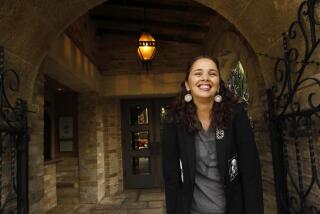John Belluso, 36; Playwright Told Tough Tales Offering a Deeper Look at the Problems the Disabled Face
- Share via
John Belluso, who emerged as a promising, widely produced playwright who told stories driven by an insider’s perspective on what it means to be disabled, has died. He was 36.
Belluso, who for six years directed or co-directed the Mark Taper Forum’s Other Voices Project, was found dead Friday in a Manhattan hotel room where he had been working since mid-January to finish a play commissioned by New York’s Public Theater.
New York Police Det. Desmond Egan said Sunday that no evidence of foul play was found in Belluso’s room at the Marriott Residence Inn. A spokeswoman for the New York City medical examiner’s office said an autopsy was performed over the weekend, but no cause of death has been determined, pending the results of lab tests that are expected in about two weeks.
Belluso coped all his life with a rare bone disorder, Engleman-Camurdrie syndrome, that friends said often caused him pain, drained his stamina and made his health an ever-present issue. His death shocked the nonprofit theater world.
“He was one of those people who is kind of a lodestar in the field,” said Oskar Eustis, artistic director of the Public Theater. Eustis commissioned “The Poor Itch,” the play Belluso, who lived in downtown L.A., had come to New York to hone. “Everybody loved John. It’s like a hole has been ripped in the universe, a terrible loss.”
“He was so charismatic, one of those great, generous personalities,” said Victoria Lewis, a professor of theater at the University of Redlands who viewed Belluso as a coming talent when she was running the Other Voices Project at the Taper -- an effort to find and foster talented disabled writers -- and began developing his plays there. “Just to be around him made you want to live more,” she said.
Among his plays are “The Body of Bourne,” which premiered at the Taper in 2001, chronicling the life of Randolph Bourne, a writer and antiwar activist during World War I who was stooped by a spinal disease, and “Gretty Good Time” (1998), about a paralyzed polio victim who insists on controlling her own fate. In “Henry Flamethrowa” (2001), people flock to the home of a long-comatose little girl who is believed to have magical healing powers, and “Pyretown” (2003) takes an acerbic look at America’s healthcare system.
“Belluso clearly has a lot of talent,” Los Angeles Times reviewer Michael Phillips wrote in a mixed review of “The Body of Bourne.” While faulting the play for not exceeding “dutiful stage biography,” he praised Belluso for “refus[ing] to lead his audience to the trough of pathos.”
In 1999, the New York Times rated “Gretty Good Time” as a “gripping” drama whose “compassionate heart and thoughtful soul” was commingled with “Belluso’s talent for caustic humor and satire.”
Lewis said Belluso strove to give audiences a deeper, tougher take on what it meant to be disabled than they could get from popular films such as “Coming Home,” “My Left Foot” and “Born on the Fourth of July.”
Instead of “the standard narrative of disability, the inspired individual overcoming a tragic situation, John writes about it as a social condition,” Lewis said. “He would say [heroic stories] are not where the drama comes from; the drama comes from people coming up against a society that devalues them and sees them as ill and un-useful.”
His play “The Poor Itch” is about a soldier from small-town, working-class America who comes home paralyzed from the Iraq War. Lisa Peterson, the former resident director at the Taper who directed the premieres of “The Body of Bourne” and “Henry Flamethrowa,” said Belluso was pushing to finish a new draft of his latest play so that it could contend for a slot in the Public’s next season.
“He knew he was on to something big,” Eustis said. “He was finding a way to combine his political concerns about the state of the nation with his beautifully observed and very personal sense about the problems of disability.”
“We all felt, ‘This is your breakout play,’ ” said Peterson, who was shepherding “The Poor Itch” through in-house workshops at the Public. “Not just ‘hmm ... interesting, quirky,’ ” a common reaction, she said, to Belluso’s other works, “but the play everyone is going to respond to. It felt mainstream, mature. It’s heartbreaking to think it won’t be finished now.”
Belluso grew up in a working-class section of Warwick, R.I., and had difficulty moving around since childhood. He began using a wheelchair at 13. His life changed in his late teens when he accompanied a friend to a production of Shakespeare’s “Julius Caesar” at Trinity Repertory Theater in Providence, R.I.
“By the second act, I had decided this is something I want to be involved with, but I didn’t know how,” he told the Providence Journal-Bulletin in 1998. From junior college theater courses, he went on to earn a bachelor’s and a 1996 master’s degree in playwriting from New York University. There he found a high-powered mentor in playwright Tony Kushner.
“John ... really lives his politics,” Kushner told the Los Angeles Times in 2001. “It’s incredibly exciting when someone with that kind of understanding of their own experience comes to the theater.”
One of Belluso’s early scripts impressed Lewis, who founded the Other Voices Project at the Taper in 1982. By 1999, he had joined her as co-director of Other Voices, and in 2002 he became sole director. His job at the Taper was erased last spring in a shake-up by Michael Ritchie, the new artistic director of its parent organization, Center Theatre Group.
By then, Peterson said, Belluso probably was earning more from TV writing, including credits on the HBO series “Deadwood” and CBS’s “Ghost Whisperer.” Productions at major regional theaters such as the Taper, Trinity Rep and the Victory Gardens Theater in Chicago established Belluso as “the star, the one who has the momentum” among disabled writers trying to crack the nonprofit circuit, Lewis said.
Belluso is survived by his mother, Sally Belluso of Warwick; and sisters Sandi Suarez of South Lake Tahoe, Calif., and Diane Bucci of Easton, Pa. Services are pending.
More to Read
The biggest entertainment stories
Get our big stories about Hollywood, film, television, music, arts, culture and more right in your inbox as soon as they publish.
You may occasionally receive promotional content from the Los Angeles Times.











